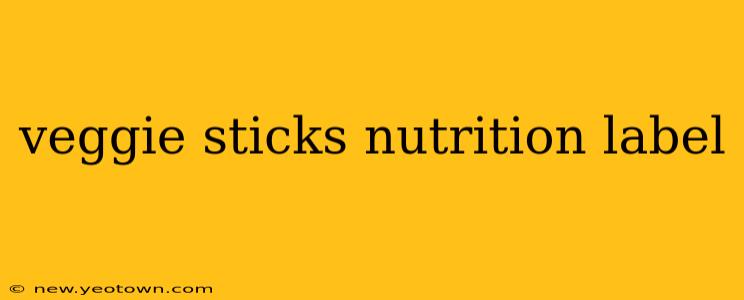Let's be honest, veggie sticks are a fantastic snack. They're crunchy, refreshing, and a guilt-free way to get your daily dose of vitamins and minerals. But have you ever really looked at the nutrition label? It's more than just a list of numbers; it's a window into the nutritional powerhouse (or potential pitfall) of your snack. This guide will help you navigate the world of veggie stick nutrition labels, ensuring you make informed and healthy choices.
What are the main components of a veggie stick nutrition label?
A typical veggie stick nutrition label, whether it's for carrots, celery, or a pre-cut vegetable mix, will include information on:
- Serving Size: This tells you how much of the product constitutes one serving. Be aware, as manufacturers can manipulate serving sizes to make certain nutritional information look better. Always compare serving sizes when comparing products.
- Calories: This shows the total energy content of a serving. Remember, calorie needs vary based on individual factors like age, activity level, and overall health goals.
- Total Fat, Saturated Fat, Trans Fat: Most vegetable sticks themselves are naturally low in fat. However, be mindful of added ingredients – some pre-cut vegetable mixes might have added oils or seasonings that increase the fat content.
- Cholesterol: Vegetables naturally contain no cholesterol. Check the ingredients list for any added items that may contain cholesterol.
- Sodium: This is where added seasonings can significantly impact the nutritional profile. Some pre-packaged veggie sticks are high in sodium. Opt for lower-sodium options or make your own for better control.
- Total Carbohydrate, Dietary Fiber, Total Sugars: Vegetables are a good source of carbohydrates and fiber. Look for high fiber options as this aids digestion and contributes to feelings of fullness. Pay attention to added sugars; some brands might add sweeteners or sugary sauces.
- Protein: While vegetables aren't the primary source of protein, they still contribute to your daily intake.
- Vitamins and Minerals: This section highlights the vitamins and minerals present in the veggie sticks, such as Vitamin A (often abundant in carrots), Vitamin C, and potassium.
What should I look for in a healthy veggie stick label?
The ideal veggie stick nutrition label should showcase:
- Low in calories: Opt for lower-calorie options to support weight management goals.
- Low in fat and saturated fat: Ideally, these should be minimal.
- Low in sodium: Excessive sodium can lead to health issues. Aim for products with lower sodium content.
- High in fiber: Fiber is crucial for digestive health and satiety.
- Good source of Vitamins & Minerals: Look for products that are rich in essential vitamins and minerals.
Are all veggie sticks created equal? What about added ingredients?
Absolutely not! While plain carrot sticks or celery are naturally low in calories and high in nutrients, pre-packaged veggie sticks can vary widely. Always check the ingredients list for added sugars, unhealthy fats, and excessive sodium. Some manufacturers might add dips or seasonings that drastically alter the nutritional profile.
How can I make healthier veggie stick choices?
- Make your own: The easiest way to ensure you're getting the healthiest veggie sticks is to cut your own vegetables at home. This gives you complete control over ingredients and avoids any unwanted additives.
- Check multiple brands: Compare nutrition labels from different brands before making a purchase to find the healthiest option.
- Choose plain varieties: Avoid pre-packaged veggie sticks with added dips or seasonings.
- Read the fine print: Pay close attention to the ingredients list, serving size, and nutritional information.
What are the potential health benefits of eating veggie sticks?
Veggie sticks offer a plethora of health benefits, including:
- Improved digestion: High fiber content supports healthy digestion.
- Weight management: Low in calories and high in fiber, they help with weight management.
- Boosted immunity: Rich in vitamins and minerals that support a healthy immune system.
- Better heart health: Many vegetables contain nutrients that support heart health.
By understanding how to interpret the nutrition label and making informed choices, you can fully enjoy the delicious and nutritious benefits of veggie sticks as a part of a healthy diet. Remember, a little knowledge goes a long way in making healthy eating choices!

